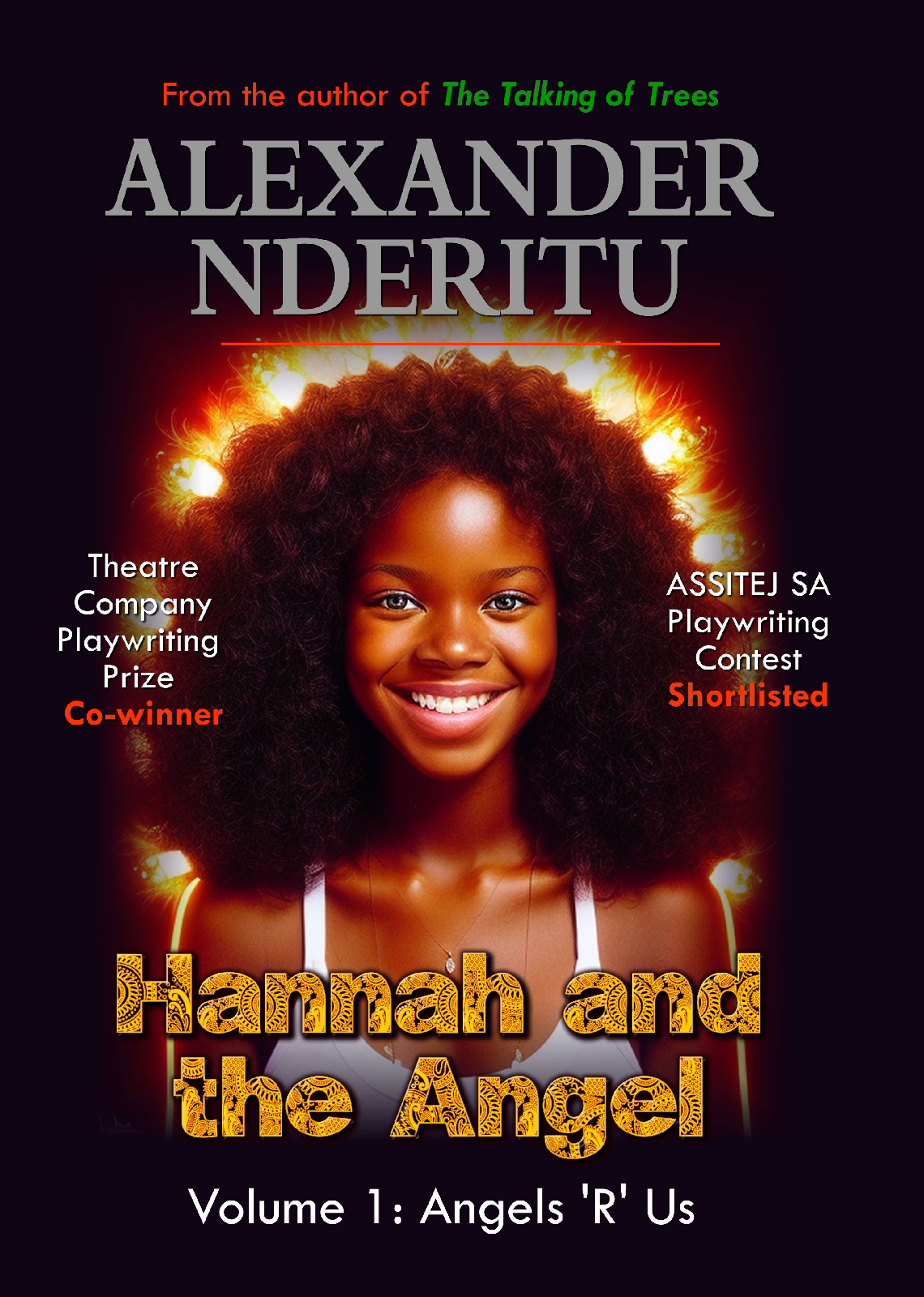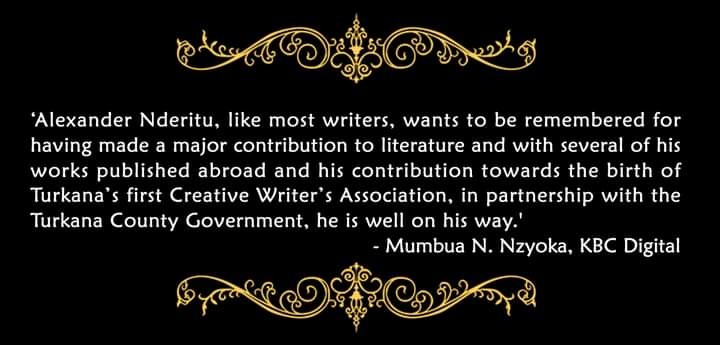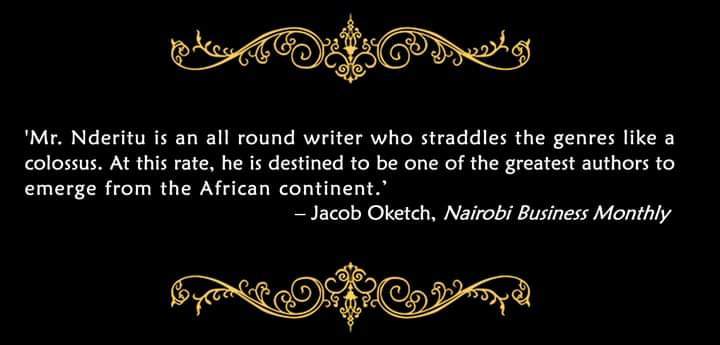ALEXANDER NDERITU'S BLOG
Official blog of Pan-Africanist writer and entertainer, Alexander Nderitu, author of 'When the Whirlwind Passes' and 'Kiss, Commander, Promise'. Contains articles, book excerpts, news, opinions, poems, quotable quotes, song lyrics, short stories and more...
Saturday, March 9, 2024
Reflections on the late Dr. Henry Chakava
Monday, February 5, 2024
BEREAVED AUTHOR SCOOPS INTERNATIONAL WRITING PRIZE
 |
| Alexander Nderitu during a studio interview |
Author Alexander Nderitu was the only African writer on last year’s Sahitto International Awards of Literature list of winners. The annual literary awards are organized by Tareq Samin; a writer, social entrepreneur and human rights activist from Bangladesh. The 2023 winners are:
‘Grand Jury Award’ Category:
- Agron Shele (Albania/Belgium)
- Vesna Mundishevska-Veljanovska (North Macedonia)
‘Excellence in Literature’ Category:
- Shurouk Hammoud (Syria/Sweden)
- Mariela Cordero (Venezuela)
- Daniela Andonovoska (North Macedonia)
- Ali Al Hasmi (Kingdom of Saudi Arabia)
‘Jury Award’ Category:
- Alexander Nderitu (Kenya)
- Rania Angelakoudi (Sweden)
- Fernando Carbrera (Dominican Republic)
- Surya Keerthy (India)
- Sushant Thapa (Nepal)
- Taghrid Bou Merhi (Lebanon)
- Yang Jijun (China)
- Anna Maria Dall’Olio (Italy)
- Armenuhi Sisyan (Armenia)
‘Special Jury Recolonization Award’
- Anna Yovka (Ukraine)
- Liang Ling (China)
- Pedro Licona (Colombia)
Alexander Nderitu, who lost his mother to cancer in October 2023, is a poet, novelist, playwright, and critic. His first book, When the Whirlwind Passes, was Africa’s pioneering digital novel. In 2017, Business Daily newspaper named him one of Kenya’s ‘Top 40 Under 40 Men’. In 2022, he took third place in the Share Africa Climate Fiction Awards. In 2023, he was shortlisted for an E. E. Sule/SEVHAGE Books African Criticism Award.
Tuesday, June 20, 2023
SHOULD PUBLISHERS EMBRACE ARTIFICIAL INTELLIGENCE?
Thursday, April 27, 2023
THE ALEXANDER NDERITU PRIZE FOR WORLD LITERATURE
Thursday, February 23, 2023
An Office-based Stage Play by Alexander Nderitu
TITLE: "YUPPIES!"
Alexander Nderitu's New Comic Play
Tuesday, November 15, 2022
JOHN SIBI-OKUMU’S ‘COLLECTED PLAYS’ – A REVIEW
 |
John Sibi-Okumu (left) received a Lifetime Achievement Award at the inaugural Kenya Theatre Awards (Photo: KTA media) |
Collected Plays (2004-2014) is a compilation of six original plays (or ‘books’, as they’re known in the West) by veteran actor/director/playwright John Sibi-Okumu. There’s a foreword by novelist Ngugi wa Thiong’o, an introduction by theatre reviewer Margaretta Wa Gacheru, and an afterword by constitutional affairs expert Prof. Yash Pal Ghai. Scripted over a decade and covering a wide range of themes, the works ‘stand alone’ and can be read in any order. I personally started with Kaggia, because it’s the best-known one. I approached the work in a two-pronged manner: from a literary point of view, and from a stage performance point of view (imagining how the pieces would play out on a stage). The plays are not in the Standard Stage Play format but are quite ‘readable’.
THE PLAYS
As Shakespeare once wrote, ‘The play is the thing’. So let’s get right to the heart of the matter…
‘Kaggia’
This is a biographical story of one of Kenya’s national heroes – Bildad Kaggia. He was one of the notorious ‘Kapenguria Six’ British colonial-era prisoners, which included future Kenyan president Jomo Kenyatta. Kaggia’s story is unique in that he appeared to shun the limelight and died unsung and, some might say, destitute. In this piece, the playwright attempts to give the audience a closer look at Kaggia, the man, so that we may better understand his sacrifices and life choices. He does this, rather shrewdly, by introducing two characters – Stacey and Xan – who are making a movie about the leftist political leader. Through their conversations and planning, we get to learn the highlights of Kaggia’s life - from circa 1921 to his death in 2005 - and legacy. Early in the story, filmmaker Stacy says:
‘At one point I did see us shooting “scenes of breathtaking natural beauty” by bringing in Kaggia’s childhood in 1920s Kenya. But if we then take him to Egypt, as a soldier then to the Holy Land and then to post-war England, before he starts his political career, we’d have a mega production…I am particularly interested in Kaggia’s relationship with his wife. It’s clearly a love story but not in the standard, Hollywood style: that’s what I see as the pillar of our story.’
 |
|
THINGS FALL APART: Characters ‘Bildad Kaggia’ and ‘Jomo Kenyatta’ have a heated ideological argument in ‘Kaggia’ which was staged at the Phoenix Theatre. |
‘Minister, Karibu’
This is the only comedy in the bunch. Like virtually everything else in the book, it was inspired by actual events. It is set during a fervent electioneering period. With the General Elections just a few months away, a host of big-name politicos converge in a hotel to hammer out a coalition deal. Meanwhile, two con men - ‘Chief’ and his friend ‘Macho’ - hatch a plan that sets the stage for a Government Inspector-like farce. Chief reckons he resembles a powerful ex-minister called W. C. Matumbato while Macho could pass for a youth leader called Hippo Dudi. The two decide to use their similarities with the public figures to rip off unsuspecting business people and politicians in the heat of the campaigns. ‘This is what I call an F.F.P,’ Chief proclaims. ‘A foolproof plan! What can possibly go wrong?’
It’s not hard to see why this play was a success. The wit is as sharp as serpent’s tooth. Minister, Karibu! was performed in English in 2012 and in Gikuyu in 2018. The English version was staged at the now-defunct Phoenix Theatre and directed by George Mungai. The Gikuyu version was performed at the Ukumbi Mdogo hall, Kenya National Theatre, and directed by Tash Mitambo. The plot could use some further tightening. For example, why would crooks bother to attempt a mobile airtime con while at the same engineering an armed robbery for a large amount of cash (that would be much more valuable and easier to utilize)?
‘Dinner at Her Excellency’s’
Unlike the others, Dinner at Her Excellency’s was written for radio, not the stage. In it, the Ambassador of an unnamed European country invites several professionals to dinner at her official residence. The objective is to pick their brains on the mood in Kenya, as the country hurtles towards a referendum on constitutional change. Like the food described in it, Dinner at Her Excellency’s is tantalizing. However, as pointed out by Prof. Ghai in the Afterword, it could have dug deeper into the issues it addresses. It also needs more SFX (sound effects) and Stage Directions as we cannot see the players at all.
‘Meetings’
Meetings is clearly warning against Post-Elect Violence (PEV), as witnessed in Kenya in 2007/2008. In it, several groups of people hold series of enlightening discussions in the run-up to a wedding between ‘Zeke’ and ‘Faoulata’. On the surface, it looks like the young lovebirds’ engagement would be a natural fit, but their families’ history and ‘baggage’ cannot be ignored.
This inter-generational play returns us to ancient oral traditions without being a ‘period piece’. It’s a brilliant way to teach history without being pedantic. Covering 43 pages, it’s the longest arrow in the quiver, and arguably the most complex and sombre. Unfortunately, it suffers the same loose copy-editing and over-punctuation as the others. Take a line like:
FAOULATA (Pause.): Zeke, do you think I’m a gold digger?
Why do you need the full stop after the word ‘Pause’? It’s not even a sentence. On Pg 97, we find the line, ‘Your father and his friends were caught and to Nyayo House, which is the yellowish building across the road.’ Perhaps that should have been ‘…caught and whisked/taken to Nyayo House’? I can visualize an actor reading that line and furrowing his brow. What’s interesting is that this book had two text editors. Perhaps for his next collection of plays, the author should hire three editors!
 |
| THE PHOENIX THEATRE CAST OF ‘MEETINGS’: (Standing L – R) Jackline Njoroge, Bruce Makau and Sam Psenjen. (Seated L- R) Jane Waithiegeni, Martin Githinji and Harry Ebale. |
‘Role Play’
Here, we get different views of contemporary Kenya, from the perspectives of diverse characters: an ageing man, a poetically-inclined house help, a young Black lady, a Kenyan-Indian, a White expatriate (or Kenyan Cowboys/Cowgirls, are they are colloquially referred to), and so on. Historical Kenyan events (such as the 1982 coup attempt) and race dynamics are expertly brought to the fore. It’s as if the author is subtly inviting dialogue on those matters, as opposed to stereotypes, conspiracies and occasional violence. I expected this to be the weakest piece in the book (because it’s the oldest one) but it turned out to be probably the most skillfully written and thought-provoking.
Role Play was first staged at The Courtyard Theatre on 3rd June 2004. It featured a multi-racial cast. Most actors played more than one role in the show, as the title suggests. In 2005, the show was reprised at the Alliance Francaise de Nairobi. Looking at the black-and-white photos of the past performances (contained in the book) will bring a tinge of nostalgia and emotion to many who are familiar with the local theatre scene. Two beautiful and talented actors therein are no longer with us. Janet Kanini (who was Black) played the roles of ‘Dudu Smith’ (an expatriate) and ‘Trupti Shah’ (a South Asian) in the original production. Lorna Irungu played those roles in the reprise. May both their souls rest in eternal peace.

THE ORIGINAL CAST OF ‘ROLE PLAY’: (L
– R) Kimberley Leonard, Janet Kanini, Collin Simpson, Mohini Balal and Lucy
Gitonga.
‘Elements’
Originally written and performed in French, this is an engaging monologue spiced up by impressions of various world accents. The protagonist, a 50-year-old female writer, has a diverse cultural heritage which makes her ethnicity difficult for people to pin down when she’s travelling around the world. It’s a relatively short piece in which the solo performer gives us an insight into her inner and outer worlds. I wouldn’t call it ‘short and sweet’ because it’s not sweet. It’s realistic – and reality is not ‘sweet’. Behind glamorous facades and admirable families, we see, are a litany of secrets and heartbreaks.
I am not sure about the relevance of the title, although it probably makes more sense in the original French. It has the same editing issues as the rest of the book eg. ‘gradmother’ instead of ‘grandmother’ (Pg. 161). All told, Elements is a shattering drama.
ONE-HANDER: Actress Nathalie Vairac
as ‘Dana’ in the ‘Elements’. 
THE AUTHOR
John Sibi-Okumu (better known as JSO) has appeared in over 40 stage productions since the 1970s. He has played such challenging lead roles as Sophocles’ King Oedipus; Shakespeare’s Romeo, Oberon and Shylock; Samuel Beckett’s Krappand Vladimir; Creon in Anouilh’s Antigone; Percy in Mtwa/Ngema/Simon’s Woza, Albert! Robert Mugabe in Fraser Grace’s Breakfast with Mugabe; and Serge in the French version of Yasmina Reza’s Art. He directed Kenyan Afro-fusion artiste Eric Wainaina’s Mo Faya! musical in the USA as part of the New York Festival of Musical Theatre in 2009. He re-united collaboration with Wainaina in 2016 when he played ‘Lion’ in the child-friendly animal-themed musical Tinga Tinga Tales.
 |
| Collin Simpson (left) and John Sibi-Okumu (‘Vladimir’) in the Beckett classic ‘Waiting for Godot’ (2005) |
Over the decades, JSO has scooped awards for best play, best director and best playwright. He has also received several lifetime achievement awards, most recently during the inaugural Kenya Theatre Awards (2022). He is well-known for having been a teacher of the French language. This lead to him being ‘knighted’ a Chevalier des Palmes Académiques, for services to French culture.
Collected Plays (2004-2014) has well-drawn characters, colloquial dialogue, and relatable themes. What we have here is a major playwright at work, probably our generation’s August Wilson. In the Foreword, Ngugi wa Thiong’o describes the author as ‘a many sided intellectual’ and remarks that ‘it is on stage that Sibi-Okumu’s various gifts have shone the most brightly.’
THE BOOK
This collection of plays was published in 2021 by Jahazi Press (Nairobi). It was officially launched at the Alliance Française de Nairobi during the inaugural NYrobi Fest. Textual editing was done by Andrew Maina and Stanley Kiio. The cover illustration is by famed cartoonist ‘Gado’ (Godfrey Mwampembwa). The book has a matte cover and an interior consisting of 186 pages of art paper. The book is enriched by precious black-and-white photos of the actual works on stage (save for Dinner at Her Excellency’s). The photos are made more poignant by the fact that some of the actors are no longer among the quick.
The editing could have been tighter. What was the rush? Some sentences go on for three or four lines, broken only by commas. That can’t be good for speech. (A TV anchor might throw a fit if they had to read such run-on sentences on live television.) Typos exist, eg. ‘…inferno is egulfling’, instead of ‘engulfing’ (Pg. 75). Luckily, for the author/publisher, if the plays are staged in future, the audience won’t see the typos!
 |
| Front cover of the book. |
Reading this bibliography of relatable plays makes one wonder why some theatre troupes still insist on (illegally) adapting foreign fare, especially farces. As the late Prof. Chris Wanjala would have said, we already have a plentiful ‘harvest of plays’ right here in our own country. And they cover a wide range of themes. Let us not be like the villainous/gullible ‘baddies’ in this collection. JSO has held up a mirror to our society. Do we fancy the reflection? To borrow the late politician Kenneth Matiba’s catchphrase: ‘Let the people decide!’
Collected Plays (2004-2014) is available at Prestige Bookshop for Kshs 1,500 (USD$ 15).
* Black-and-white photo credits: Hervé Braneyre, Joel Magu, Richard Onyinge, Tash Mitambo, Khamis Ramadhan and Sanaa Post.











